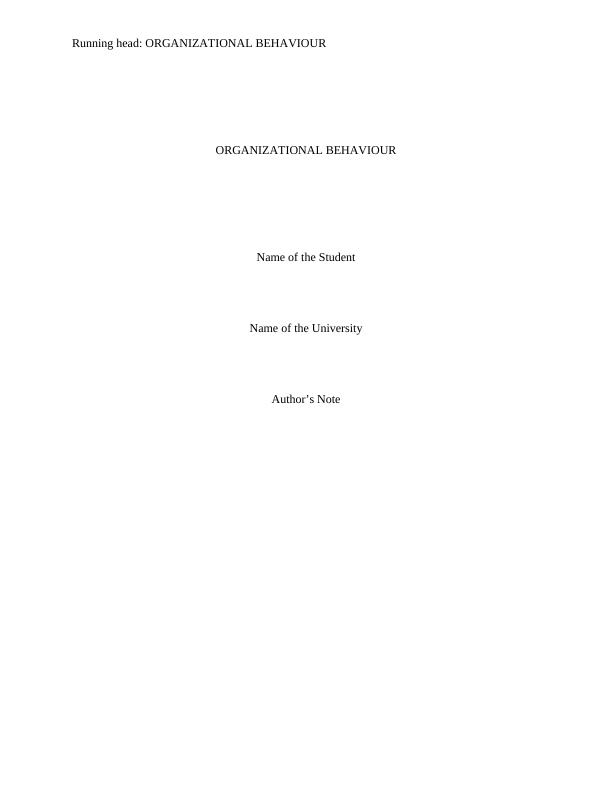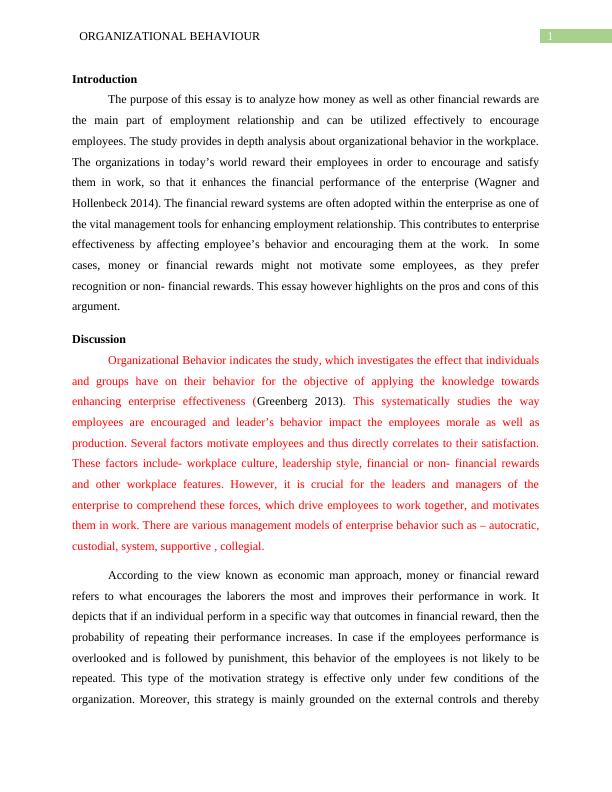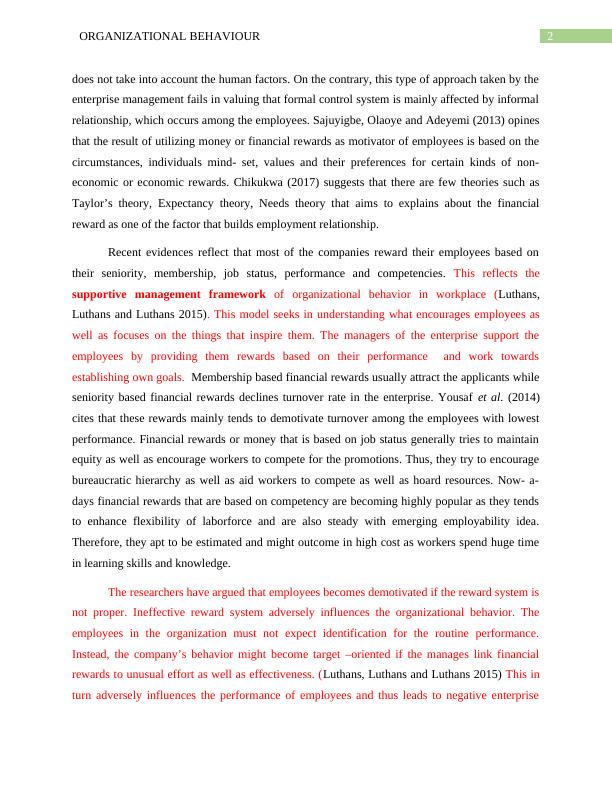The Pros and Cons of Using Financial Rewards to Motivate Employees
Added on 2023-06-10
7 Pages1934 Words121 Views
Running head: ORGANIZATIONAL BEHAVIOUR
ORGANIZATIONAL BEHAVIOUR
Name of the Student
Name of the University
Author’s Note
ORGANIZATIONAL BEHAVIOUR
Name of the Student
Name of the University
Author’s Note

1ORGANIZATIONAL BEHAVIOUR
Introduction
The purpose of this essay is to analyze how money as well as other financial rewards are
the main part of employment relationship and can be utilized effectively to encourage
employees. The study provides in depth analysis about organizational behavior in the workplace.
The organizations in today’s world reward their employees in order to encourage and satisfy
them in work, so that it enhances the financial performance of the enterprise (Wagner and
Hollenbeck 2014). The financial reward systems are often adopted within the enterprise as one of
the vital management tools for enhancing employment relationship. This contributes to enterprise
effectiveness by affecting employee’s behavior and encouraging them at the work. In some
cases, money or financial rewards might not motivate some employees, as they prefer
recognition or non- financial rewards. This essay however highlights on the pros and cons of this
argument.
Discussion
Organizational Behavior indicates the study, which investigates the effect that individuals
and groups have on their behavior for the objective of applying the knowledge towards
enhancing enterprise effectiveness (Greenberg 2013). This systematically studies the way
employees are encouraged and leader’s behavior impact the employees morale as well as
production. Several factors motivate employees and thus directly correlates to their satisfaction.
These factors include- workplace culture, leadership style, financial or non- financial rewards
and other workplace features. However, it is crucial for the leaders and managers of the
enterprise to comprehend these forces, which drive employees to work together, and motivates
them in work. There are various management models of enterprise behavior such as – autocratic,
custodial, system, supportive , collegial.
According to the view known as economic man approach, money or financial reward
refers to what encourages the laborers the most and improves their performance in work. It
depicts that if an individual perform in a specific way that outcomes in financial reward, then the
probability of repeating their performance increases. In case if the employees performance is
overlooked and is followed by punishment, this behavior of the employees is not likely to be
repeated. This type of the motivation strategy is effective only under few conditions of the
organization. Moreover, this strategy is mainly grounded on the external controls and thereby
Introduction
The purpose of this essay is to analyze how money as well as other financial rewards are
the main part of employment relationship and can be utilized effectively to encourage
employees. The study provides in depth analysis about organizational behavior in the workplace.
The organizations in today’s world reward their employees in order to encourage and satisfy
them in work, so that it enhances the financial performance of the enterprise (Wagner and
Hollenbeck 2014). The financial reward systems are often adopted within the enterprise as one of
the vital management tools for enhancing employment relationship. This contributes to enterprise
effectiveness by affecting employee’s behavior and encouraging them at the work. In some
cases, money or financial rewards might not motivate some employees, as they prefer
recognition or non- financial rewards. This essay however highlights on the pros and cons of this
argument.
Discussion
Organizational Behavior indicates the study, which investigates the effect that individuals
and groups have on their behavior for the objective of applying the knowledge towards
enhancing enterprise effectiveness (Greenberg 2013). This systematically studies the way
employees are encouraged and leader’s behavior impact the employees morale as well as
production. Several factors motivate employees and thus directly correlates to their satisfaction.
These factors include- workplace culture, leadership style, financial or non- financial rewards
and other workplace features. However, it is crucial for the leaders and managers of the
enterprise to comprehend these forces, which drive employees to work together, and motivates
them in work. There are various management models of enterprise behavior such as – autocratic,
custodial, system, supportive , collegial.
According to the view known as economic man approach, money or financial reward
refers to what encourages the laborers the most and improves their performance in work. It
depicts that if an individual perform in a specific way that outcomes in financial reward, then the
probability of repeating their performance increases. In case if the employees performance is
overlooked and is followed by punishment, this behavior of the employees is not likely to be
repeated. This type of the motivation strategy is effective only under few conditions of the
organization. Moreover, this strategy is mainly grounded on the external controls and thereby

2ORGANIZATIONAL BEHAVIOUR
does not take into account the human factors. On the contrary, this type of approach taken by the
enterprise management fails in valuing that formal control system is mainly affected by informal
relationship, which occurs among the employees. Sajuyigbe, Olaoye and Adeyemi (2013) opines
that the result of utilizing money or financial rewards as motivator of employees is based on the
circumstances, individuals mind- set, values and their preferences for certain kinds of non-
economic or economic rewards. Chikukwa (2017) suggests that there are few theories such as
Taylor’s theory, Expectancy theory, Needs theory that aims to explains about the financial
reward as one of the factor that builds employment relationship.
Recent evidences reflect that most of the companies reward their employees based on
their seniority, membership, job status, performance and competencies. This reflects the
supportive management framework of organizational behavior in workplace (Luthans,
Luthans and Luthans 2015). This model seeks in understanding what encourages employees as
well as focuses on the things that inspire them. The managers of the enterprise support the
employees by providing them rewards based on their performance and work towards
establishing own goals. Membership based financial rewards usually attract the applicants while
seniority based financial rewards declines turnover rate in the enterprise. Yousaf et al. (2014)
cites that these rewards mainly tends to demotivate turnover among the employees with lowest
performance. Financial rewards or money that is based on job status generally tries to maintain
equity as well as encourage workers to compete for the promotions. Thus, they try to encourage
bureaucratic hierarchy as well as aid workers to compete as well as hoard resources. Now- a-
days financial rewards that are based on competency are becoming highly popular as they tends
to enhance flexibility of laborforce and are also steady with emerging employability idea.
Therefore, they apt to be estimated and might outcome in high cost as workers spend huge time
in learning skills and knowledge.
The researchers have argued that employees becomes demotivated if the reward system is
not proper. Ineffective reward system adversely influences the organizational behavior. The
employees in the organization must not expect identification for the routine performance.
Instead, the company’s behavior might become target –oriented if the manages link financial
rewards to unusual effort as well as effectiveness. (Luthans, Luthans and Luthans 2015) This in
turn adversely influences the performance of employees and thus leads to negative enterprise
does not take into account the human factors. On the contrary, this type of approach taken by the
enterprise management fails in valuing that formal control system is mainly affected by informal
relationship, which occurs among the employees. Sajuyigbe, Olaoye and Adeyemi (2013) opines
that the result of utilizing money or financial rewards as motivator of employees is based on the
circumstances, individuals mind- set, values and their preferences for certain kinds of non-
economic or economic rewards. Chikukwa (2017) suggests that there are few theories such as
Taylor’s theory, Expectancy theory, Needs theory that aims to explains about the financial
reward as one of the factor that builds employment relationship.
Recent evidences reflect that most of the companies reward their employees based on
their seniority, membership, job status, performance and competencies. This reflects the
supportive management framework of organizational behavior in workplace (Luthans,
Luthans and Luthans 2015). This model seeks in understanding what encourages employees as
well as focuses on the things that inspire them. The managers of the enterprise support the
employees by providing them rewards based on their performance and work towards
establishing own goals. Membership based financial rewards usually attract the applicants while
seniority based financial rewards declines turnover rate in the enterprise. Yousaf et al. (2014)
cites that these rewards mainly tends to demotivate turnover among the employees with lowest
performance. Financial rewards or money that is based on job status generally tries to maintain
equity as well as encourage workers to compete for the promotions. Thus, they try to encourage
bureaucratic hierarchy as well as aid workers to compete as well as hoard resources. Now- a-
days financial rewards that are based on competency are becoming highly popular as they tends
to enhance flexibility of laborforce and are also steady with emerging employability idea.
Therefore, they apt to be estimated and might outcome in high cost as workers spend huge time
in learning skills and knowledge.
The researchers have argued that employees becomes demotivated if the reward system is
not proper. Ineffective reward system adversely influences the organizational behavior. The
employees in the organization must not expect identification for the routine performance.
Instead, the company’s behavior might become target –oriented if the manages link financial
rewards to unusual effort as well as effectiveness. (Luthans, Luthans and Luthans 2015) This in
turn adversely influences the performance of employees and thus leads to negative enterprise

End of preview
Want to access all the pages? Upload your documents or become a member.
Related Documents
Importance of Motivation in the Workplacelg...
|8
|1906
|434
Pros and Cons of Employee Motivation through Monetary Rewardslg...
|8
|2265
|41
Pros and Cons of Using Money as a Motivator in Employment Relationshipslg...
|8
|2377
|74
Pros and Cons of Using Money and Financial Rewards to Motivate Employeeslg...
|7
|2094
|456
Pros and Cons of Using Financial Rewards to Motivate Employeeslg...
|8
|2323
|27
Money and Other Rewards as Motivators for Employees: Pros and Conslg...
|8
|2464
|164
